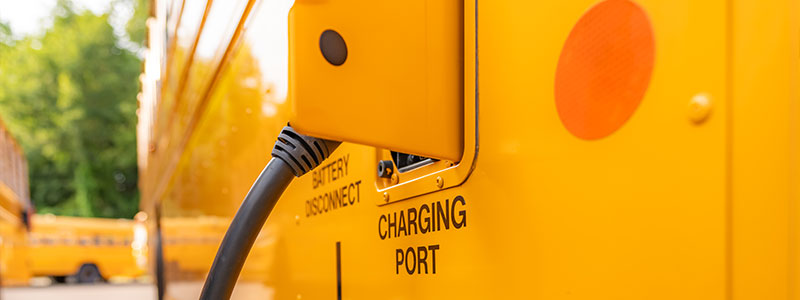Recognizing the need for a cleaner, greener, and safer mode of student transportation, several states have announced an electric school bus mandate.
This mandate sets out to achieve several key objectives:
1. Emission Reduction: By transitioning to electric school buses, the mandate aims to significantly reduce harmful emissions and their associated health risks.
2. Mitigating Climate Change: Electric school buses are a cleaner alternative, reducing the carbon footprint of student transportation.
3. Health and Safety: The mandate prioritizes the well-being of students by reducing exposure to harmful emissions and enhancing the overall safety of student transportation.
4. Cost-Effectiveness: While electric school buses have a higher upfront cost, they can lead to substantial savings over the long term. Reduced fuel and maintenance costs make them an economically viable option.
5. Technological Advancement: The electric school bus mandate encourages the adoption of cutting-edge technologies, promoting innovation in the transportation sector.
6. Future-Proofing: By embracing electric buses, school districts are preparing for the future. They are aligning themselves with the transition towards electric vehicles that is sweeping the automotive industry.
The Role of Technology
Implementing the electric school bus mandate requires a technological overhaul of the school transportation sector. Key technological innovations include:
1. Electric Buses: The introduction of electric school buses, powered by clean and sustainable energy sources, is at the heart of the mandate. These buses eliminate tailpipe emissions and reduce noise pollution.
2. Charging Infrastructure: The development of charging infrastructure at school bus depots is essential. Electric school buses need reliable charging stations to ensure they are ready for daily routes.
3. Telematics and Data Management: Telematics systems and data management solutions play a crucial role in monitoring and managing electric bus fleets. These technologies enable real-time tracking, battery management, route optimization, and data analysis to ensure safe and efficient operations.
4. Battery Technology: Advancements in battery technology are extending the range of electric school buses. Modern lithium-ion batteries provide the necessary power and range for daily routes while maintaining safety standards.
5. Driver Training and Education: Preparing school bus drivers to operate electric buses safely is vital. Drivers must be educated on the unique features and handling characteristics of electric vehicles.
Highland Electric Fleets, a Massachusetts-based trailblazer in school bus fleet electrification, has emerged as a true leader in the quest for a greener and safer future for school transportation. Established in 2019, Highland set out to provide a comprehensive solution that simplifies the transition from diesel to electric school bus fleets for districts throughout the U.S. and Canada.
Highland’s all-encompassing approach leaves no room for guesswork, offering a seamless path to electrification:
- Infrastructure Development: Highland takes care of the intricate process of developing the necessary infrastructure for electric school bus deployment.
- Electric Vehicle Procurement: The company assists in the procurement of electric buses, ensuring that school districts acquire the most suitable and efficient electric vehicles.
- Utility Interconnection: Highland manages the critical task of utility interconnection, ensuring that electric buses can be charged efficiently and cost-effectively.
- Depot Electrification: Electric vehicle chargers are installed at depots to facilitate convenient and efficient charging operations.
- Chargers and Charge Management: Highland’s expertise extends to charger installation and effective charge management, ensuring that electric buses are ready to roll when needed.
Highland collaborates closely with school districts to phase in electric buses by replacing aging diesel buses in a manner that aligns with district budgets and current EV technology capabilities. This approach ensures affordability and ease of transition while managing the entire process with a team of experts.
Matt Guevara, Product Marketing Manager, summarizes Highland’s approach succinctly: “As an electrification-as-a-service company, Highland provides everything a district needs to electrify their fleet, from planning to implementation and ongoing charging operations. Simply, we remove the high upfront cost and overall complexity of fleet transitions.”
Highland’s Journey with Zonar
As Highland strives to fulfill the electric bus mandate for schools, the company recognizes the need for comprehensive visibility into all aspects of electric fleets. This visibility is essential to:
- Ensure that electric school buses are adequately charged for their routes.
- Optimize charging times and manage electricity costs.
- Access specific data sets required to power their charge management software, known as the Highland Dashboard.
- A significant portion of Highland’s fleet comprises the Thomas Built Bus Saf-T-Liner® C2 Jouley® electric school buses, each equipped with the Zonar V4™ telematics solution. The collaboration with Zonar, with their factory-installed telematics solution, has been integral to Highland’s success in navigating the challenges of electric fleet management.
Managing Charging Costs Effectively
While electric school bus batteries have the range to cover over 90% of existing school bus routes, charging must be meticulously planned and coordinated to ensure that routes are met and electricity costs are minimized. The costs of charging can fluctuate depending on utility rates and the time of day when charging occurs.
Highland required a solution that would provide districts with range awareness and proper charger scheduling to ensure that each bus was adequately charged before beginning its route, all while minimizing utility costs. The ability to determine bus scheduling and locations was crucial for optimizing charging efficiency, considering return times to the depot and utility rates at specific times.
Zonar’s Role in Success
For Highland, Zonar emerged as the perfect partner. Zonar’s V4 Telematic Control Units (TCUs) were already installed on the C2 Jouley buses Highland had purchased, eliminating the need for additional installation costs. Zonar’s willingness to provide the essential data, which other telematics providers struggled to offer, was pivotal in Highland’s journey. This includes State-of-Charge.
Sean Leach, Highland’s Director of Technology and Platform Management, emphasized Zonar’s commitment to addressing uncertainties and new challenges: “David [Pearson] and his team at Zonar were willing partners in a brand-new industry with a lot of uncertainty, which was huge for us.”
Customized Data and Flexibility
Zonar’s data customization and flexibility have enabled Highland to navigate changes and challenges effectively. Electric fleet charging involves numerous variables, including utility rate charges, driver behaviors, routes, weather, and charging infrastructure sufficiency. Any change in these variables impacts the charging schedule.
Zonar’s ability to capture essential electric bus data, including bus location and battery state of charge (SoC), has empowered Highland to respond swiftly and efficiently to changes in its electric fleet charging schedule. This data is vital to ensuring that buses complete their routes without disrupting school schedules.
Highland’s Competitive Edge
Highland’s partnership with Zonar has not only streamlined their operations but also elevated their position in the sector. Zonar’s hardware is a leading choice among Original Equipment Manufacturers (OEMs), providing Highland with a wide range of bus choices to offer to school districts. Furthermore, the data provided by Zonar has played a pivotal role in Highland’s ability to secure new business and lead the way in turnkey electric bus offerings.
Sean Leach sums up the importance of Zonar in Highland’s operations: “We want happy customers with buses on the road as much as possible. The fact is, we could not operate an electric fleet without the data Zonar provides us.”







